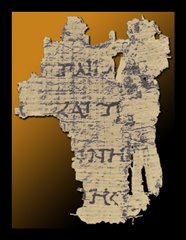The majority church insists that,
a) in order to die for our sins, Jesus had to be ‘God’ and that
b) if he were anyone other than a divine person in the godhead, then God’s sacrifice is in some way diminished.
What follows are a couple of my views on these 2 points:
a) Did Jesus really have to be God Almighty in order to die for our sins?
The demand that God himself had to personally come and die for our sins comes from man, not God. From philosophy, not revelation. Otherwise it would be stated in the Bible. What the Bible does tell us is that God has dealt with sin by sending his Son to be the propitiatory sin-offering. God takes sin so seriously that he was prepared to sacrifice his own beloved Son in order to provide a solution to the problem.
According to Romans 5:12-21, it was by a man that sin entered into the world, therefore justification would also have to come by man- another Adam. This text shows that it is Jesus’ righteousness and obedience as a human being that qualify him to be the redeemer. What’s emphasised over and again is that the Messiah be a kinsman, closely related to those whom he must redeem. ‘Divinity’ is nowhere in the horizon.
Likewise, 1Corinthians 15:21 “For since by man came death, by man came also the resurrection from the dead”, followed by another comparison between Jesus and Adam. This would hardly be fair one if Adam is a ‘mere man’ and Jesus is the Godhead incarnate.
In fact, the expression ‘mere man’ itself exposes a failure to understand the Biblical doctrine of man. Humanity should not be judged by the depths it has fallen to in Adam, but in the height and greatness of God’s design, as revealed through Christ. This comparison does much to expose the debilitating effects of sin. Our humanity is broken and stifled. In Jesus, humanity finds its full expression. So sin could not be taken more seriously than in John 3:16, yet it says that God gave his beloved Son, not himself.
Many loving parents would testify that this is the harder and more costly of the two sacrifices to make.
b) What did God sacrifice?
There is no doubt the cross is central to Christology, but I also think that the ‘orthodox’ (Trinitarian) view misses out something important here.
I would ask you-
When God forsook his Son, what was left on the cross? A complete man? Or a human body, minus the divine personal centre?
Was it a matter of ‘God the Son’ merely surrendering his human body and returning to the existence he enjoyed prior to being ‘incarnated’ into it?
Or did Jesus as a man and no more, really pour out all that he was, without remainder, trusting that he would not be left in Sheol, but that God would raise him again? Is this not the faith of the Son of God which Paul refers to in Galatians 2:20?
It would hardly take trust for an ‘eternal person’ to go back to being what he had been for far longer than he had been a man, indeed, for eternity. Far from being some great sacrifice, if this really were the case, might it not come as something of a relief to be freed once more from such burdensome and cumbersome human limitations?
Moments from death, Jesus cried out ‘my God, my God, why have you forsaken me?’ Jesus called on the Father as his God. So the Father therefore the God of the Son. Both Peter and Paul unashamedly call him not only the Father of our Lord Jesus Christ, but also his God (2 Cor 11:31; Eph 1:3; 1Pet 1:3). From this it would appear that Jesus is not just someone other than the Father. He is someone other than God.
What is more Jesus did not call out, as one person in the Triune godhead to another, “My Father, my Father…” Instead, he confessed to being forsaken by God. Yet, according to ‘orthodoxy’ ‘godness’ is the very basis of the ontological union of the godhead. How could Jesus both be God and forsaken by God?
Let’s not forget that the Bible clearly states in 1Tim 1:17 and 1Tim 6:16 that God is immortal. This means that (according to the Biblical definition of immortality in Luke 20:36) he cannot die. So to believe that Jesus is God, yet died, is incompatible with what the Bible so clearly tells us.
In this way if a Trinitarian Christology is rigorously applied to the Biblical record of the passion of the Christ, the supreme act of love and sacrifice by both Father and Son is reduced to a contradictory muddle.
Have you checked out the main web-site at www.Godfellas.org ?
Subscribe to:
Post Comments (Atom)




No comments:
Post a Comment